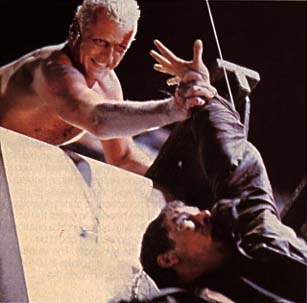SCIENCE FICTION - Course Summary
SCHEDULE |
SYLLABUS |
SCORES |
SCIFI
FORUM

BLADE RUNNER
Blade
Runner is one of two Ridley Scott films we use to open our
discussion of science fiction.. It is one of the most highly regarded
science fiction films ever made. Initially the film received very little
critical attention, but fans immediately began discussing the film using a
new media, the internet to answer FAQ (Frequently Asked
Questions) about this movie. There is also aBlade Runner Online
Magazine full of pictures from the movie.
All of these sites give you some idea of fans' high regard for Scott's
film. To prepare for our discussion visit the Off-World Blade
Runner Page an informative web source containing quotes, pictures, and
short essays, and partcipate in one of the discussion forums you can reach
under the SPECIAL: discussions, overviews, FAQ menu on that
site. Use one of the discussion groups. Ask a question that interests
you and /or helps you understand the film. Send me an email teling me what you found and what
discussion you joined, so I can see what you asked and/or said. You also
might want to look at the Blade
Runner Discussion Guide.
ALIEN
Our second film Alien is another
of Ridley Scott's explorations of the realm of science fiction. It is the
first film in a seeries of four. You will find it useful to visit the Xenomorph: The
Alien Movies Site or Alien
Homepage where you can check out music, pictures, FAQs, scripts,
quotes and other Alien Trilogy materials. The Alien Legacy web site provides a way of quickly
exploring all these films and their relationships to each other. It is
also connected to the Aliens Ring, a group of connnected web sites that
all deal with the Alien series. To prepare for our discussion, each of
visit some of these connected sites, find a discussion group, and
partcipate in a discussion. Send me an email telling me what you found and what
discussion you joined, so I can see what you asked and/or said. You can
also look at the Alien
Discussion Guide.
MARTIAN CHRONICLES
 Our first novel,Ray
Bradbury's Martian Chronicles is one of the classics of "Golden
Age" science fiction. Written shortly after the end of the second world
war, in a time more aware of the nuclear sword of Damocles than our own,
Bradbury's collection of interrelated short stories, originally published
in science fiction pulp magazines, is extraordinarily well written and
curiously contemporary. Again prepare for our discussion by visiting the
Ray Bradbury
Links web site which has a list of links to Bradbury materials on the
world wide web and find some information that you think might give us all
insights about Martian Chronicles. Send me an email telling me what you found and look
at the Martian
Chronicles Discussion Guide as well.
Our first novel,Ray
Bradbury's Martian Chronicles is one of the classics of "Golden
Age" science fiction. Written shortly after the end of the second world
war, in a time more aware of the nuclear sword of Damocles than our own,
Bradbury's collection of interrelated short stories, originally published
in science fiction pulp magazines, is extraordinarily well written and
curiously contemporary. Again prepare for our discussion by visiting the
Ray Bradbury
Links web site which has a list of links to Bradbury materials on the
world wide web and find some information that you think might give us all
insights about Martian Chronicles. Send me an email telling me what you found and look
at the Martian
Chronicles Discussion Guide as well.
CANTICLE FOR LEIBOWITZ
Walter Miller's Canticle for Leibowitz also emerges from pulp
magazine science fiction, but cleary is one of the most important
departures from that tradition as well. Craig Engler's review of Miller's
novel concludes:
"...it's an incredibly successful attempt to explore the uber-concepts
of religion, humanity and survival through characters that are utterly
human and mundane. The story eventually builds to a climax that is more
cerebral than physical, and so profound that it may leave readers with the
urge to flip back to the beginning and read again."
Miller's novel in three parts about a post nuclear holocaust repetition
of the cycle of dark ages, renaissance, and age of science explores
everything from luddites to existentialists in terms of the
faith/knowledge paradox. It touches issues as various as the immaculate
conception, genetic mutation and euthanasia. For twenty years science
fiction fans, writers and critics voted Canticle for Leibowitz the
best science fiction novel ever written. Its explorations of monastic
life are especially interesting and anticipate the ways in which
relationships between religion and science are changing in our own time.
Prepare for our discussion by reading Craig Engler's
review. Send me an email telling
me what you think of it. Look at the
Canticle for Leibowitz Discussion Guide as
well.
MAN IN A HIGH CASTLE
Philip
K. Dick has become one of the most highly regarded science fiction
writers during last twenty years. He wrote the novel that was the basis
for Blade Runner, a story that became the script for Total
Recall, and the story on which Screamers is based. In Man in a High
Castle Dick plays with the interfaces between fact and fiction,
illusion and reality, past, present, and future, to help us examine the
relationships between free indiviuals and fate. He draws heavily on Taoism and the I-Ching.
Prepare for our discussion by visiting the I Ching site, asking the
oracle a question about the novel, and sending me an email letting me know what your question
was and what you make of the answer you got. Look at the Man in a High
Castle Discussion Guide as well.
BOY AND HIS DOG
Harlan
Ellison is another of the "new wave" writers of the sixties and
seventies and the most important editor critic of science fiction in the
second half of this century. His short
stories set new standards for craftsmanship and wit, and in editing
two collections of short stories written by his peers, Dangerous
Visions and Dangerous Visions Again, freed science fiction
writers to experiment with the themes and techniques that have produced
the new science fiction. He also wrote for the original Star Trek series and did the script, based on his
short story, for this film.
Ellison wrote the script for this film, based on his own short story.
Prepare for our discussion by visiting the Ellison Webderland site and going to the FAQ
(Frequently Asked Questions) file there and find an interesting question
and answer, and email me a copy. Look
at theA Boy
And His Dog Discussion Guide as well.
LEFT HAND OF DARKNESS
Ursula
K. Le Guin is arguably the best science fiction writer writing and may
very well be simply one of the best writers of the twentieth century. She has
written children's stories, fantasy, utopian novels and science fiction.
She draws heavily form the social sciences, particulary, anthropology (her
mother and father were both anthropolgists) in building her stories; it is
precisely this shift away from the "hard" sciences that identifies her
with the "new wave" science fiction writers of the late sixties. In a
feild that had been dominated by males, she set new standars for science
fiction. She and other women writers have been deeply involved in
developing a feminist perspective on what an ideal society, a utopia, might
be. She also has been an outstanding critic of science fiction.
Prepare for our discussion by visiting the Feminist Utopias web site,
reading the Whys
and Wherefores essay, and sending me an email with your reaction. Look at the Left Hand of
Darkness Discussion Guide as well.
ENDER'S GAME
Orson Scott Card's novel,
Ender's Game is the first novel in a series of four which includes
Speaker for the Dead, Xenocide and Children of the
Mind and represents the most serious exploration of contact with
aliens to emerge in contemporary science fiction. The series raises
fundamental questions about human nature, cultural imperialism and our
attitudes towards other life forms. It has produced intense interest
amongst fans and critics.
Prepare for our discussion by visiting Card's official web site and enter
the Hatrack River
Forums there.
Make a statement about your reaction to Ender's Game and see what kind of
response you get. send me an email
explaining what happened. Look at the Ender's Game
Discussion Guide as well.
OTHER PLACES TO LOOK
The views and opinions expressed in this page are strictly those of the
page author. The contents of this page have not been reviewed or approved
by the University of Minnesota.
This web page (http://www.d.umn.edu/~tbacig/scifi/) is maintained by Tom
Bacig, and was last updated Sunday, 26-Nov-2000 20:26:24 CST. Send comments
to tbacig@d.umn.edu.

![[Free Speech Online]](ribbar.gif)
© 1996, Tom Bacig, University of Minnesota,
Duluth.
The University of Minnesota is an equal opportunity educator and
employer.
 Our first novel,Ray
Bradbury's Martian Chronicles is one of the classics of "Golden
Age" science fiction. Written shortly after the end of the second world
war, in a time more aware of the nuclear sword of Damocles than our own,
Bradbury's collection of interrelated short stories, originally published
in science fiction pulp magazines, is extraordinarily well written and
curiously contemporary. Again prepare for our discussion by visiting the
Ray Bradbury
Links web site which has a list of links to Bradbury materials on the
world wide web and find some information that you think might give us all
insights about Martian Chronicles. Send me an email telling me what you found and look
at the Martian
Chronicles Discussion Guide as well.
Our first novel,Ray
Bradbury's Martian Chronicles is one of the classics of "Golden
Age" science fiction. Written shortly after the end of the second world
war, in a time more aware of the nuclear sword of Damocles than our own,
Bradbury's collection of interrelated short stories, originally published
in science fiction pulp magazines, is extraordinarily well written and
curiously contemporary. Again prepare for our discussion by visiting the
Ray Bradbury
Links web site which has a list of links to Bradbury materials on the
world wide web and find some information that you think might give us all
insights about Martian Chronicles. Send me an email telling me what you found and look
at the Martian
Chronicles Discussion Guide as well. 

![[Free Speech Online]](ribbar.gif)